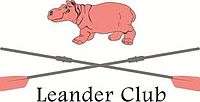Leander Club
| Leander Club | |
|---|---|
 | |
|
| |
 | |
| Motto | Corpus Leandri spes mea |
| Location | Remenham, Berkshire, England |
| Coordinates | 51°32′17″N 0°53′57″W / 51.53806°N 0.89917°WCoordinates: 51°32′17″N 0°53′57″W / 51.53806°N 0.89917°W |
| Home water | Henley Reach, River Thames |
| Founded | 1818 |
| Affiliations | British Rowing |
| Website |
www |
| Notable members | |
| See below | |

Leander Club, founded in 1818,[1] is one of the oldest rowing clubs in the world, and the oldest non-academic club. It is based in Remenham in Berkshire, England and adjoins Henley-on-Thames. Only three other surviving clubs were founded prior to Leander: Brasenose College Boat Club and Jesus College Boat Club (the two competing in a Head race in 1815) and Westminster School Boat Club, founded in 1813.
History
Leander was founded on the Tideway in 1818 or 1819 by members of the old "Star" and "Arrow" Clubs and membership was at first limited to sixteen.[2] "The Star" and "the Arrow" clubs died out sometime in the 1820s and Leander itself was in full swing by 1825. By 1830 it was looked upon as a well-known and long-established boat club.[3]
In its early days, Leander was as much a social association as a competitive club and it was steered by a waterman. It was the first club to support young watermen and instituted a coat and badge for scullers. In 1831 Leander defeated Oxford University in a race rowed from Hambleden Lock to Henley Bridge, but when it lost the match with Cambridge six years later, Lord Esher noted at a dinner that Leander was:
"a London Club consisting of men who had never been at the University but ... were recognised throughout England, and perhaps everywhere in the world, as the finest rowers who had up to that time been seen."
However, he also noted that they were 'verging on being middle aged men.'[2] Up until 1856 the number of members was limited to twenty-five men. After this date membership was increased to thirty-five and the limit finally abolished in 1862.[3] In 1858 Leander began to recruit members from both Oxford University and Cambridge University.
Its first home is assumed to have been Searle's yard, Stangate — on the south bank of the River Thames (on land currently occupied by St Thomas's Hospital).[4] In 1860 the membership moved the club to Putney where a small piece of land was rented on which a tent was erected for housing boats. This land was bought by London Rowing Club in 1864 and is the site of LRC's current clubhouse. Leander were able to lease a piece of land adjoining and in 1866 started to construct a boathouse. Thirty years later, in 1897, the club purchased land in Henley-on-Thames and built its current clubhouse. The club's centre of gravity moved rapidly to Henley, although the Putney boathouse was retained until 1961.
Leander entered a crew at Henley Royal Regatta for the first time in 1840, the year following the regatta's foundation. Their crew which won the Grand Challenge Cup included Thomas Lowther Jenkins in the 5 seat. Jenkins' winner's medal was discovered in a Belfast junk shop more than 130 years later by a Member who donated it to the Club, where it sits in one of the trophy cabinets.
For the first 179 years of its existence it was a male-only club but opened its doors to women members in 1998 in recognition of the emergence and strength of the GB women's rowing team, and not because of financial considerations as the UK's Sports Council rules required organizations receiving funding to have an open membership policy, as was commonly reported in the press at that time. On 1 January 2013 Debbie Flood was elected as the club's first female captain, and was re-elected the following year.
Leander was one of five clubs which retained the right until 2012 to appoint representatives to the Council of British Rowing. The others were London Rowing Club, Thames Rowing Club, Oxford University Boat Club and Cambridge University Boat Club.[5]
Notable members
Notable members include:
- Alexander McCulloch
- Robin Bourne-Taylor
- Ed Coode
- James Cracknell
- Debbie Flood
- Tim Foster
- Harcourt Gilbey Gold
- Jürgen Gröbler
- Mark Hunter
- Frederick Septimus Kelly
- Hugh Laurie
- Ran Laurie
- Gully Nickalls
- Guy Nickalls
- Alex Partridge
- Matthew Pinsent
- Steve Redgrave
- Pete Reed
- Rebecca Romero
- Colin Smith
- Tom Stallard
- Anna Watkins
- Josh West
- Steve Williams
See also
References
- ↑ Leander Club: History
- 1 2 Sport, ancient and modern: Pastimes, A History of the County of Middlesex: Volume 2: General pp. 283-292. Date accessed: 8 October 2008
- 1 2 Woodgate, W.B. (1891). The Badmington library - "Boating". Spottiswoode & co.
- ↑ Burnell, Richard; Page, Geoffrey (1997). The Brilliants - A History of the Leander Club. Leander Club. ISBN 0-9500061-1-4.
- ↑ "Corporate Governance Structure". British Rowing. Retrieved 31 January 2013.